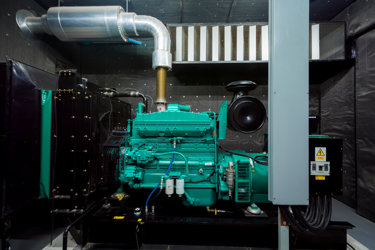Winter blackouts: Will your backup generators work in the event of a power outage?
Published: 3 November 2022
Rolling blackouts could be imposed on the UK in January and February 2023 as a result of insufficient gas supplies from Europe. Ensuring continuity of power is of critical importance this winter.
Karl Webster, Head of Specialist Fuel Services, explains the issues of microbial contamination in backup generator tanks, and how a focus on fuel testing and pre-planned maintenance is critical to minimise operational downtime.
As a result of tougher renewable energy targets set by the European Renewable Energy Directive and the UK’s Renewable Transport Fuel Obligation (RTFO), the composition of the fuels we use has changed dramatically over the years.
Fuel composition
When traditional petroleum-based diesels were used, you could have a backup generator fuel tank that was 50 years old and – providing the suction point (the point where the fuel leaves the tank) was set above where any water/sludge could be sitting – you wouldn’t experience any issues. This is because traditional diesel absorbed considerably less moisture than the diesel we use now.
With the addition of renewable bio content into diesel, commonly known as FAME (Fatty Acid Methyl Ester), problems can arise.
FAME is hygroscopic, which means that it attracts and holds on to moisture that can become suspended within the fuel. FAME can also act as a detergent within the tank, cleaning contaminants from tank walls and pipework, which can also end up in the fuel itself and, ultimately, into engine filters.
When you add water into the mix (which can find its way into a tank through condensation, rainwater penetration, or even moisture in the air), then we have the perfect environment for microbial contamination; and with FAME being biodegradable, the perfect source of nutrients for the microbes to feed on.

Operational risks of microbial contamination
As diesel is commonly used for emergency power generation, the potential for microbial growth exposes businesses to considerable operational risk.
Many operations have the facility to switch over to oil, but if that fuel has been sat stagnant for prolonged periods of time, it may not function when it is needed most.
Once microbial contamination starts it can grow very quickly. From one year to the next you can have a clean bill of health, to heavily contaminated fuel.
With even small amounts of water in a tank system, reformulated fuels can create a maintenance nightmare, such as biological activity, increased corrosion, blocked filters, lower pump flow rates, or total failure. Testing has therefore evolved from a best practice discipline to a critical part of the tank maintenance process.
If microbial contamination has occurred, we can uplift the fuel from your tank, perform a thorough clean of the tank’s internals to remove any contaminates, and then polish the fuel back to the clean tank. This will ensure a clean bill of health and, crucially, ensure the generator will provide power when required.
In the event of an extended power outage, we can also provide emergency fuel to keep your backup systems going.
With increased demand on capacity this winter, the best course of action is prevention.
We recommend testing your tanks ahead of the winter period and regularly throughout, to ensure your backup generator provides the power required in the event of a power outage caused by a blackout. Because an absolute focus on storage integrity has never been more critical for today’s backup generator.
More from our Knowledge Hub
 News
NewsDemystifying the new biodiversity net gain legislation
 Case study
Case studyBlue carbon habitat suitability assessments in Scotland as part of Carbon Neutral Islands project
 Insights
InsightsChanges to ESOS reporting system and compliance notification deadline extended to 6 August 2024
 Insights
InsightsEverything you need to know about ESOS phase 3
Keep your business compliant and protect the environment while reducing the risk of operational downtime
Find out how Adler and Allan reduce your risk and support you on your journey to Net-Zero through the management and maintenance of assets.
Contact our experts

